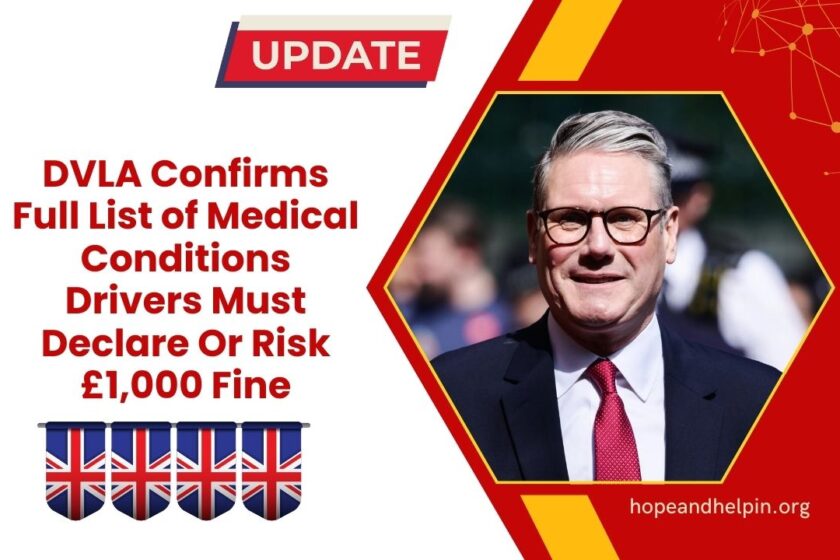The Driver and Vehicle Licensing Agency (DVLA) has issued a strong reminder that drivers must declare specific medical conditions to avoid fines of up to £1,000. Failure to report could also result in prosecution if an accident occurs.
For those who develop a new health condition, or if an existing one worsens, the DVLA must be notified immediately. This is part of a broader push to improve road safety and ensure drivers meet the legal fitness-to-drive standards.
Why You Must Report Your Condition
If you suffer from a notifiable medical condition, it may affect your ability to drive safely. Declaring it ensures the DVLA can assess whether you are fit to continue driving. The agency may:
- Request medical reports from your GP or specialist
- Ask you to undergo a driving assessment or eyesight test
- Temporarily suspend your licence until further checks are complete
In some cases, you may be allowed to continue driving while your application is being considered. However, failing to declare can lead to a £1,000 fine and possible legal action if your condition leads to a road incident.
The £1,000 Fine and Beyond
- £1,000 fine for not reporting a condition
- Possible prosecution if an accident occurs
- Risk of being banned from driving
- Requirement to reapply for your licence with new medical evidence if advised by DVLA
For older drivers, particularly those over 70 years of age, upcoming proposals may add mandatory eye tests and health assessments to ensure ongoing driving fitness.
Full List of Notifiable Conditions
The DVLA has published an extensive list of medical conditions that must be reported. These include:
- Neurological conditions such as epilepsy, seizures, strokes, dementia, multiple sclerosis, and Parkinson’s disease
- Cardiovascular problems like angina, heart attacks, arrhythmias, and heart failure
- Mental health conditions including severe depression, psychosis, bipolar disorder, and schizophrenia
- Vision impairments such as glaucoma, double vision, tunnel vision, and blindness in one eye
- Other major illnesses like diabetes with hypoglycaemia, cancer, kidney dialysis, and sleep apnoea
With over 200 conditions listed, drivers are strongly urged to check if theirs is included.
DVLA Medical Condition Reporting – Key Summary
| Category | Examples of Notifiable Conditions |
|---|---|
| Neurological | Epilepsy, seizures, dementia, stroke, narcolepsy, motor neurone disease |
| Cardiovascular | Angina, heart attack, arrhythmia, heart failure, valve disease |
| Vision | Double vision, tunnel vision, blindness in one eye, macular degeneration |
| Mental Health | Bipolar disorder, severe depression, schizophrenia, psychosis, anxiety disorders |
| Other Conditions | Diabetes (with hypoglycaemia), cancer, kidney dialysis, sleep apnoea, lung disease |
What Happens After You Report?
Once you declare your condition:
- DVLA reviews your medical details
- They may consult with your doctor or arrange a medical assessment
- You may be asked to take an eye test or driving assessment
- You’ll receive a decision—either retaining your licence, a temporary suspension, or being asked to reapply later
If told to stop driving, you can appeal the decision with new medical evidence.
The DVLA’s warning is clear: if you have a notifiable medical condition, you must declare it. Not only could failing to do so cost you £1,000, but it may also put your safety and others at risk. With over 200 conditions on the list, drivers should check carefully and ensure they remain compliant.
Protecting your licence is simple—report changes, undergo assessments if required, and keep Britain’s roads safer for everyone.
FAQs
What happens if I fail to report my medical condition?
You risk a £1,000 fine, prosecution if involved in an accident, and the potential loss of your driving licence.
Can I keep driving while DVLA reviews my case?
In many cases, yes. You can continue driving while your application is being processed unless the DVLA instructs you otherwise.
Do all medical conditions need to be reported?
No, only notifiable medical conditions. These include serious neurological, cardiovascular, mental health, and vision problems that affect safe driving.
